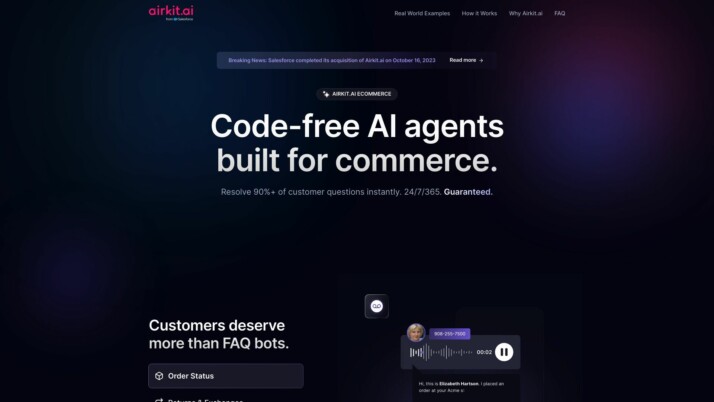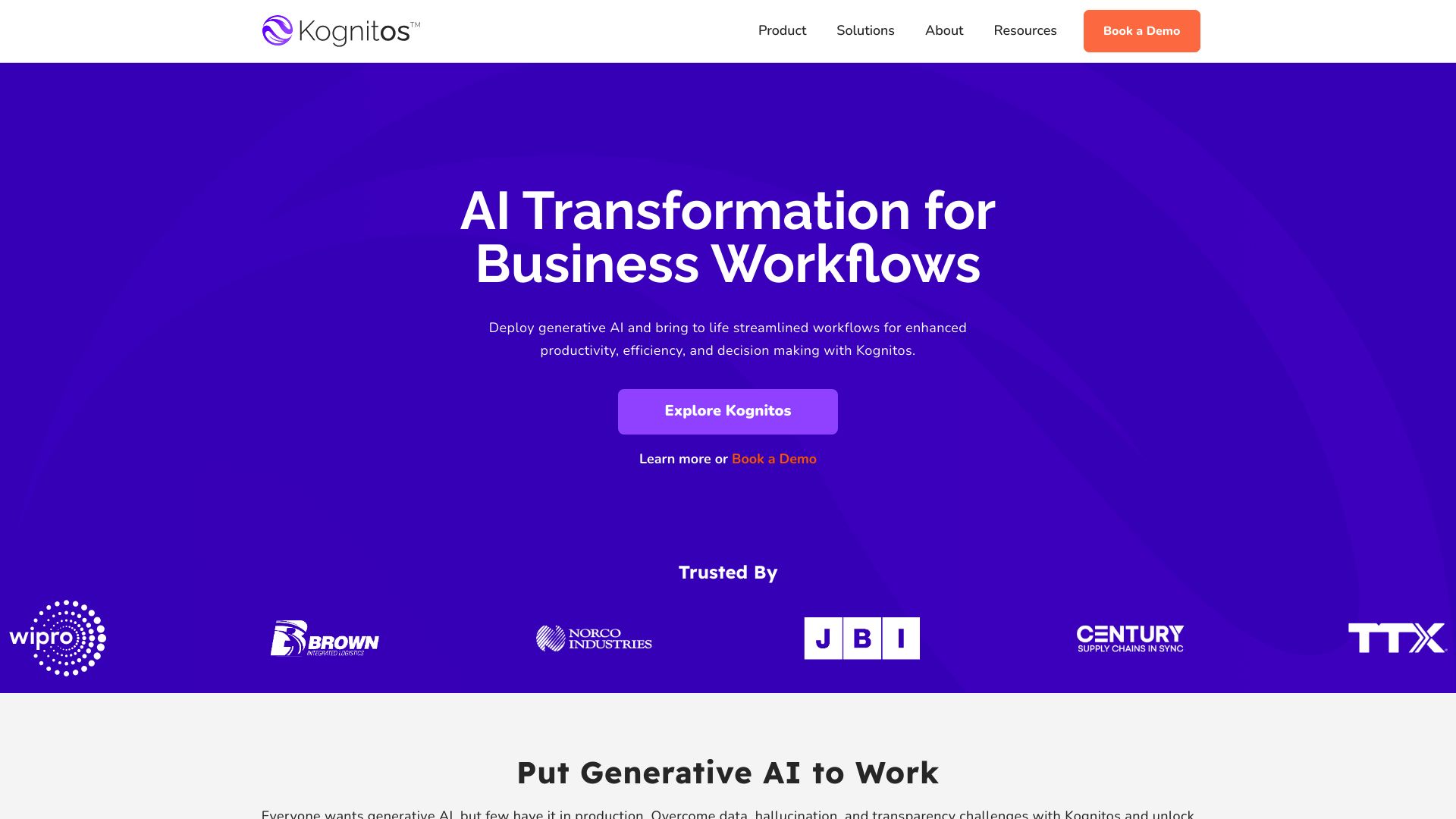Airkit AI vs. Kognitos: Comparative Analysis for AI-Powered Automation
AI-powered automation revolutionizes how businesses operate, streamline processes, and enhance customer experiences. This comparison explores Airkit AI vs. Kognitos, and SmythOS — three leading platforms reshaping the AI landscape. Airkit AI specializes in ecommerce support automation with Salesforce integration, while Kognitos focuses on natural language-based process automation.
SmythOS emerges as a versatile solution, combining powerful features from both platforms and introducing advanced capabilities. We’ll examine each platform’s strengths, limitations, and unique offerings to help you determine the best fit for your organization’s AI automation needs. Whether you’re a developer seeking robust APIs, a business leader prioritizing scalability, or a non-technical user looking for accessible tools, this guide provides valuable insights to inform your decision-making process.
Airkit AI Overview
Airkit AI transforms customer service by offering AI-powered agents that resolve issues autonomously across multiple channels. Acquired by Salesforce in 2023, Airkit AI integrates seamlessly with existing CRM and helpdesk systems to automate repetitive support tasks.


The platform enables businesses to deploy intelligent AI agents without coding, leveraging pre-built conversational skills for ecommerce. These agents learn continuously from customer interactions and business policies, providing personalized support 24/7. Airkit AI’s cloud-based infrastructure auto-scales to meet demand spikes, ensuring consistent performance during high-volume periods.
Airkit AI’s no-code approach democratizes AI deployment, allowing non-technical teams to create and manage sophisticated support automation.
Airkit AI’s no-code approach democratizes AI deployment, allowing non-technical teams to create and manage sophisticated support automation. The platform’s Co-Pilot mode facilitates human-AI collaboration, empowering service teams to work alongside AI agents for optimal issue resolution. Built-in safeguards and compliance standards ensure responsible AI use, addressing privacy and ethical concerns.
While Airkit AI excels in ecommerce support automation, it may have limitations for businesses seeking highly customized AI solutions or those outside the retail sector. The platform’s focus on Salesforce integration could potentially restrict its applicability for organizations using different CRM systems.
Airkit AI positions itself as a leader in AI-driven customer service automation, particularly for ecommerce businesses. Its strengths lie in rapid deployment, scalability, and seamless integration with Salesforce ecosystems. However, companies requiring extensive customization or industry-specific AI solutions may need to evaluate alternatives carefully.
Kognitos Overview
Kognitos revolutionizes AI-based automation with its innovative platform that operates using plain human language. Users build, handle exceptions, and review logs in simple English, democratizing AI power across organizations. The platform integrates traditional logic with generative AI, creating a powerful and efficient automation solution that learns over time through natural dialogue.
Kognitos revolutionizes AI-based automation with its innovative platform that operates using plain human language. Users build, handle exceptions, and review logs in simple English…
Kognitos distinguishes itself from traditional Robotic Process Automation (RPA) by eliminating the need for bot management. The system runs entirely from a browser, utilizing stable API-based automations for seamless integration with third-party applications across multiple operating systems. This approach overcomes the limitations of Windows-based solutions, offering greater flexibility and scalability.


Adaptability stands out as a key strength of Kognitos. The platform handles exceptions by learning from user input, making it highly capable of managing changes and variations in processes. This self-learning capability ensures that automations remain effective even as business processes evolve, reducing the need for constant manual updates.
Adaptability stands out as a key strength of Kognitos. The platform handles exceptions by learning from user input, making it highly capable of managing changes and variations in processes.
Kognitos offers tools for document processing, Excel manipulation, email handling, and integration with systems like Salesforce. However, the platform lacks some advanced features found in other AI agent builders, such as a visual builder, debug mode, or multi-agent collaboration. Despite these limitations, Kognitos’ focus on natural language processing and user-friendly automation positions it as a valuable tool for businesses looking to streamline operations without extensive technical expertise.
While Kognitos excels in making AI automation accessible, potential users should consider their specific needs, especially if they require more advanced AI functionalities or extensive customization options. The platform’s strengths in adaptability and ease of use make it particularly suitable for organizations seeking to implement AI solutions quickly and efficiently, with minimal disruption to existing workflows.
Feature Comparison
Airkit AI and Kognitos offer distinct approaches to AI-powered automation, each with its own strengths and limitations. Airkit AI excels in ecommerce support automation, providing AI agents that seamlessly integrate with Salesforce and other CRM systems. Its no-code approach allows for rapid deployment of intelligent agents capable of resolving customer issues across multiple channels. Kognitos, on the other hand, focuses on natural language-based automation, enabling users to build and manage processes using plain English.
Where Airkit AI shines in customer service applications, Kognitos demonstrates versatility in broader business process automation. Airkit AI’s tight integration with Salesforce may limit its applicability for organizations using different CRM systems, while Kognitos offers more flexibility in integrating with various third-party applications. However, Kognitos lacks some advanced features found in other AI agent builders, such as a visual builder or debug mode.
In terms of security and compliance, both platforms prioritize data protection and adherence to industry standards. However, SmythOS outperforms both by offering a more comprehensive suite of security features, including advanced data encryption, OAuth integration, and IP control capabilities. SmythOS also provides superior scalability and deployment options, allowing users to deploy agents as APIs, webhooks, or scheduled tasks — functionalities not explicitly mentioned for Airkit AI or Kognitos.
Feature Comparison Table
| Airkit AI | Kognitos | SmythOS | |
|---|---|---|---|
| CORE FEATURES | |||
| Visual Builder | ❌ | ❌ | ✅ |
| Explainability & Transparency | ❌ | ✅ | ✅ |
| Debug Tools | ❌ | ✅ | ✅ |
| Multimodal | ❌ | ✅ | ✅ |
| Multi-Agent Collaboration | ❌ | ✅ | ✅ |
| Audit Logs for Analytics | ❌ | ✅ | ✅ |
| Work as Team | ❌ | ✅ | ✅ |
| Agent Work Scheduler | ❌ | ✅ | ✅ |
| SECURITY | |||
| Constrained Alignment | ✅ | ❌ | ✅ |
| IP Control | ❌ | ❌ | ✅ |
| COMPONENTS | |||
| Foundation AIs | ❌ | ✅ | ✅ |
| Huggingface AIs | ❌ | ✅ | ✅ |
| Zapier APIs | ❌ | ❌ | ✅ |
| Classifiers | ❌ | ✅ | ✅ |
| Logic | ❌ | ✅ | ✅ |
| Data Lakes | ❌ | ❌ | ✅ |
| DEPLOYMENT OPTIONS (EMBODIMENTS) | |||
| Deploy as API | ❌ | ✅ | ✅ |
| Deploy as Webhook | ❌ | ❌ | ✅ |
| Staging Domains | ❌ | ✅ | ✅ |
| API Authentication (OAuth + Key) | ❌ | ✅ | ✅ |
| Deploy as Site Chat | ✅ | ❌ | ✅ |
| Deploy as Scheduled Agent | ❌ | ✅ | ✅ |
| Deploy as GPT | ❌ | ❌ | ✅ |
| DATA LAKE SUPPORT | |||
| Hosted Vector Database | ❌ | ❌ | ✅ |
| Sitemap Crawler | ❌ | ❌ | ✅ |
| YouTube Transcript Crawler | ❌ | ❌ | ✅ |
| URL Crawler | ❌ | ❌ | ✅ |
| PDF Support | ❌ | ✅ | ✅ |
| Word File Support | ❌ | ✅ | ✅ |
| TXT File Support | ❌ | ✅ | ✅ |
Best Alternative to Airkit AI and Kognitos
SmythOS stands out as the superior alternative to Airkit AI and Kognitos, offering a comprehensive AI agent development platform that combines power, flexibility, and ease of use. Our drag-and-drop interface allows users to create sophisticated AI workflows without extensive coding knowledge, democratizing AI development across various skill levels.
Unlike Airkit AI’s focus on ecommerce support or Kognitos’ emphasis on natural language automation, SmythOS provides a versatile ecosystem supporting a wide range of use cases. We offer pre-built API integrations and templates that significantly reduce setup time, allowing users to focus on innovation rather than implementation details. Our platform seamlessly integrates with popular services like Slack, Trello, and GitHub, ensuring SmythOS fits into virtually any existing workflow.
SmythOS excels in multi-agent orchestration, enabling teams of AI agents to collaborate on complex tasks. This feature enhances efficiency and scalability far beyond what Airkit AI or Kognitos can offer.
SmythOS excels in multi-agent orchestration, enabling teams of AI agents to collaborate on complex tasks. This feature enhances efficiency and scalability far beyond what Airkit AI or Kognitos can offer. Additionally, our platform provides unparalleled deployment flexibility, allowing users to deploy agents as APIs, webhooks, scheduled tasks, or even as ChatGPT plugins — options not explicitly available with competing platforms.
We prioritize security and compliance, offering advanced features like data encryption, OAuth integration, and IP control capabilities. These robust security measures, combined with our scalable architecture, make SmythOS the ideal choice for businesses of all sizes, from startups to large enterprises. By choosing SmythOS, users gain access to a cutting-edge AI operating system that not only meets current needs but is also poised to adapt to future challenges in the rapidly evolving field of AI automation.
Conclusion
Airkit AI and Kognitos offer compelling AI-powered automation solutions, each with unique strengths. Airkit AI excels in ecommerce support, leveraging Salesforce integration for rapid deployment of customer service agents. Kognitos stands out with its natural language-based approach, enabling users to build automations using plain English.
While both platforms have their merits, SmythOS emerges as the superior choice for businesses seeking comprehensive AI agent capabilities. Our platform combines the best of both worlds — the ease of use found in Airkit AI and the adaptability of Kognitos — while offering additional features that set it apart.
SmythOS provides unparalleled flexibility with its drag-and-drop interface, extensive integration ecosystem, and support for multiple AI models. We enable users to create sophisticated multi-agent systems, deploy across various platforms, and scale effortlessly. Our robust security measures, including advanced data encryption and OAuth integration, ensure peace of mind for enterprise users.
For those ready to revolutionize their workflows with AI, we invite you to explore our diverse range of AI-powered agent templates. These templates cover multiple business categories and offer a quick start to building custom AI solutions. To experience the full potential of SmythOS, create a free account and start building AI agents with no time limit or risk. Join us in shaping the future of AI-powered automation and unlock unprecedented efficiency for your business.
Last updated:
Disclaimer: The information presented in this article is for general informational purposes only and is provided as is. While we strive to keep the content up-to-date and accurate, we make no representations or warranties of any kind, express or implied, about the completeness, accuracy, reliability, suitability, or availability of the information contained in this article.
Any reliance you place on such information is strictly at your own risk. We reserve the right to make additions, deletions, or modifications to the contents of this article at any time without prior notice.
In no event will we be liable for any loss or damage including without limitation, indirect or consequential loss or damage, or any loss or damage whatsoever arising from loss of data, profits, or any other loss not specified herein arising out of, or in connection with, the use of this article.
Despite our best efforts, this article may contain oversights, errors, or omissions. If you notice any inaccuracies or have concerns about the content, please report them through our content feedback form. Your input helps us maintain the quality and reliability of our information.
